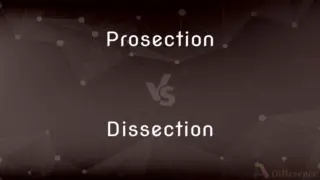Wain vs. Wane — What's the Difference?
By Tayyaba Rehman & Fiza Rafique — Updated on March 31, 2024
Wain refers to a large, open vehicle for transporting goods, while wane means to decrease in size, intensity, or power.

Difference Between Wain and Wane
Table of Contents
ADVERTISEMENT
Key Differences
A wain is traditionally used in agriculture or historical contexts to describe a type of wagon or cart, specifically designed for heavy loads. It is often associated with rural settings and has been a crucial part of farming and transportation history. On the other hand, wane is a term that denotes a reduction or decline in condition, power, or size. It's frequently used to describe the phases of the moon, as well as metaphorically to denote the diminishing of interest, power, or vitality.
While a wain is a tangible object with a specific, physical utility in transporting goods, wane represents a process or condition, marking the transition towards a lesser state. For example, a farmer might use a wain to carry harvested crops, whereas an athlete’s dominance in a sport might wane as they age.
The usage of "wain" has remained relatively consistent over time, primarily referring to its role in agriculture and transport. In contrast, "wane" is used more broadly across various contexts, from astronomy to everyday language, to indicate a decrease or decline in a wide range of phenomena.
"Wain" conjures images of rural life, agriculture, and historical transportation methods, serving as a reminder of past ways of living and working. "Wane," however, is more abstract, capturing the natural cycle of growth and decline that affects all things, from celestial bodies to human interests and emotions.
Despite their phonetic similarity, the terms occupy completely different realms—one being a physical object and the other a process or condition. This distinction highlights the diversity and richness of the English language in describing both concrete and abstract concepts.
ADVERTISEMENT
Comparison Chart
Definition
A large open vehicle for transporting goods
To decrease in size, intensity, or power
Context
Agriculture, transportation
Astronomy, general use
Nature
Tangible object
Process or condition
Usage
Historical and rural settings
Broad, including metaphorical uses
Connotation
Rural life, agriculture
Decline, diminishment
Compare with Definitions
Wain
A farm wagon or cart.
They loaded the hay onto the wain at sunset.
Wane
To decrease in size or magnitude.
The moon begins to wane after the full moon.
Wain
Historical term for wagon.
The museum displayed a reconstructed wain from the 18th century.
Wane
A decline in condition or vigor.
Interest in the project started to wane over time.
Wain
Used in medieval contexts to describe various carts.
The knight’s supplies were carried in a sturdy wain.
Wane
To diminish in intensity or power.
The storm’s fury began to wane by morning.
Wain
Often associated with Charles's Wain (the Big Dipper).
They navigated by following Charles's Wain in the night sky.
Wane
To fade away or become less.
As the evening progressed, the party’s energy waned.
Wain
A large, open vehicle for carrying loads.
The old wain creaked under the weight of the harvest.
Wane
The act of decreasing gradually.
The king’s influence waned in his final years.
Wain
The Big Dipper.
Wane
(of the moon) have a progressively smaller part of its visible surface illuminated, so that it appears to decrease in size.
Wain
A large open farm wagon.
Wane
(of a state or feeling) decrease in vigour or extent; become weaker
Confidence in the dollar waned
Wain
A wagon; a four-wheeled cart for hauling loads, usually pulled by horses or oxen.
"The Hay Wain" is a famous painting by John Constable.
Wane
The amount by which a plank or log is bevelled or falls short of a squared shape
I cut the log into slabs without removing the outside wane
Wain
To carry.
Wane
To decrease gradually in size, number, strength, or intensity
Interest in the subject waned.
Wain
A four-wheeled vehicle for the transportation of goods, produce, etc.; a wagon.
The wardens see nothing but a wain of hay.
Driving in ponderous wains their household goods to the seashore.
Wane
To show a progressively smaller illuminated area, as the moon does in passing from full to new.
Wain
A chariot.
Wane
To approach an end
The day began to wane.
Wain
English writer (1925-1994)
Wane
The act or process of gradually declining or diminishing.
Wain
A group of seven bright stars in the constellation Ursa Major
Wane
A time or phase of gradual decrease.
Wain
Large open farm wagon
Wane
The period of the decrease of the moon's illuminated visible surface.
Wane
A defective edge of a board caused by remaining bark or a beveled end.
Wane
A gradual diminution in power, value, intensity etc.
Wane
The lunar phase during which the sun seems to illuminate less of the moon as its sunlit area becomes progressively smaller as visible from Earth.
Wane
(literary) The end of a period.
Wane
(woodworking) A rounded corner caused by lack of wood, often showing bark.
Wane
A child.
Wane
A house or dwelling.
Wane
(intransitive) To progressively lose its splendor, value, ardor, power, intensity etc.; to decline.
Wane
(intransitive) Said of light that dims or diminishes in strength.
Wane
Said of the Moon as it passes through the phases of its monthly cycle where its surface is less and less visible.
Wane
(intransitive) Said of a time period that comes to an end.
Wane
To decrease physically in size, amount, numbers or surface.
Wane
To cause to decrease.
Wane
To be diminished; to decrease; - contrasted with wax, and especially applied to the illuminated part of the moon.
Like the moon, aye wax ye and wane.Waning moons their settled periods keep.
Wane
To decline; to fail; to sink.
You saw but sorrow in its waning form.
Land and trade ever will wax and wane together.
Wane
To cause to decrease.
Wane
The decrease of the illuminated part of the moon to the eye of a spectator.
Wane
Decline; failure; diminution; decrease; declension.
An age in which the church is in its wane.
Though the year be on the wane.
Wane
An inequality in a board.
Wane
The natural curvature of a log or of the edge of a board sawed from a log.
Wane
A gradual decline (in size or strength or power or number)
Wane
Grow smaller;
Interest in the project waned
Wane
Become smaller;
Interest in his novels waned
Wane
Decrease in phase;
The moon is waning
Common Curiosities
Can the word "wain" refer to any vehicle?
Historically, "wain" refers specifically to a type of large, open vehicle for transporting heavy loads, not just any vehicle.
Is "wane" only used to describe the moon?
While commonly used to describe the diminishing phase of the moon, "wane" can also refer to any decrease or decline in condition or power.
How are "wain" and "wane" related?
"Wain" and "wane" are not related in meaning; they are homophones in English, meaning they sound similar but have different definitions.
What does it mean to wane?
To wane means to decrease in size, intensity, or power, often used to describe diminishing conditions or phases.
Does "wane" imply a natural process?
"Wane" often implies a natural or inevitable process of decrease or decline, whether in nature, interest, or power.
What historical significance does a "wain" have?
Historically, wains were vital for agriculture and transportation, essential for carrying heavy loads before the advent of modern vehicles.
Can technology wane?
Yes, the relevance or dominance of certain technologies can wane as new advancements emerge.
What is a wain?
A wain is a large, open vehicle, typically a wagon or cart, used for transporting goods, especially in agricultural settings.
Can health wane?
Health can wane, referring to a decline in physical or mental condition over time.
What causes a wane in popularity?
A wane in popularity can be caused by various factors, including changing public tastes, competition, or negative publicity.
Can a person's popularity wane?
Yes, a person's popularity can wane, indicating it decreases or diminishes over time.
Is there a modern equivalent of a wain?
Modern equivalents of a wain include trucks and trailers, which serve similar purposes in transportation and agriculture.
What is Charles's Wain?
Charles's Wain is an archaic name for the Big Dipper constellation, historically used in navigation.
How does the economy wane?
The economy can wane during periods of downturn, where economic activity, investment, or consumer spending decreases.
Is it correct to say interest wanes?
Yes, it is correct to say interest wanes, meaning that interest in a subject, activity, or object diminishes over time.
Share Your Discovery

Previous Comparison
Egotistical vs. Narcissistic
Next Comparison
Prosection vs. DissectionAuthor Spotlight
Written by
Tayyaba RehmanTayyaba Rehman is a distinguished writer, currently serving as a primary contributor to askdifference.com. As a researcher in semantics and etymology, Tayyaba's passion for the complexity of languages and their distinctions has found a perfect home on the platform. Tayyaba delves into the intricacies of language, distinguishing between commonly confused words and phrases, thereby providing clarity for readers worldwide.
Co-written by
Fiza RafiqueFiza Rafique is a skilled content writer at AskDifference.com, where she meticulously refines and enhances written pieces. Drawing from her vast editorial expertise, Fiza ensures clarity, accuracy, and precision in every article. Passionate about language, she continually seeks to elevate the quality of content for readers worldwide.
















































